#louis francois lejeune
Text
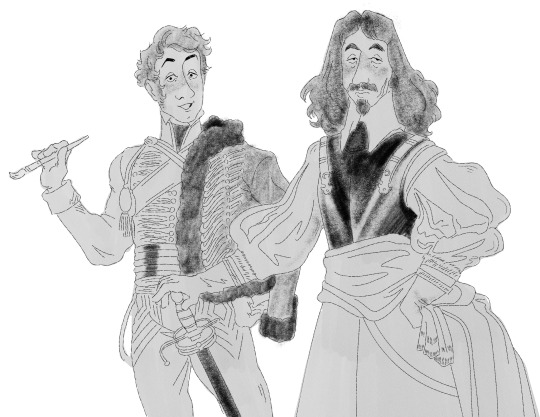
Requests 2/10
Louis-Francois Lejeune @kaxenart
Thomas Fairfax aka Lord Fairfax @ceescendo
62 notes
·
View notes
Text

The return of the inexplicably glossy-eyed cow and Martin the valet.
On August 29 we entered the pretty town of Wiasma, which was completely wrapt in flames, the very churches being on fire. Although the quarters assigned to me were in the courtyard of one of the finest hotels in the town, I had to pass the night in my carriage. On the 30th the Emperor arrived at Wiasma, leaving again on the 31st, and on September 1 we entered Giatz, forty leagues from Moscow. The town, which was of wood, was burnt to the ground, but some cellars were still undestroyed, and in them we found a few stores of cucumbers, cabbages, and beetroots, which are used by the Russians in making a fermented beverage. My horses and carriages occupied the courtyard of a fine house which had been burnt. I wanted my people to do something for me, and called them several times without obtaining an answer. I had begun to get impatient and was shouting out their names angrily, when I suddenly heard several voices crying in a stifled sepulchral kind of way, 'Monsieur! Monsieur!' The sound seemed to come from the centre of the courtyard, but I could see no one there. In my surprise and anxiety I called to them again, receiving only the same muffled answers. I rushed to the spot and found myself at the edge of a deep well, in which the skillful foragers, having let themselves down by a knotted rope, had discovered a number of valuable objects placed for security at the bottom of the water. The plucky fellows now climbed up one by one, each carrying under his arm some treasures, such as rolls of gold or silver brocade, headdresses and bodices adorned with pearls and gold ornaments, which had belonged to the Jewish women of the community, all of whom had fled. I scolded the men for pillaging, and forbade them to take anything more.
#napoleonic#napoleonic era#napoleonic wars#louis francois lejeune#louis-francois lejeune#during the russian campaign
49 notes
·
View notes
Text
Lejeune about Soult
So far I had not checked Lejeune’s memoirs for what he had to say on Soult when Lejeune was sent to Spain by Napoleon, in order to put together an extended report on the situation in the peninsula. Somehow the idea didn't even occur to me. (I probably didn't want to trespass on @kaxen's territory 😁.) And given Lejeune’s character (rather opposed to Soult’s), the fact that he was one of Berthier’s guys (whom Soult despised) and also was very close to Joseph (who despised Soult even more), I honestly expected the worst.
But to my astonishment and Lejeune’s credit, he really tries to be fair to everyone, and his account of the interviews he had with Soult even hints at some level of compassion.
Marshal Soult received me with distinction. After having spoken to me for a long time in private about his position, and having made me accept the most honourable hospitality in his house, he sent his aides-de-camp to accompany me on the visit which I had to make to all the services of his army.
Soult: Boys, take this nice monsieur to town and show him around.
ADCs: Sure thing! Where do you want to go? We know the best booze… oh, you mean military stuff.
I thus spent three days in Seville, busy seeing the troops, the arsenals, the ironworks, the hospitals, and all the military and civil establishments functioning for the army. An admirable activity was impressed upon all the administrations, and there was a great deal of order. […]
Order, under Soult? Who would have thought. - Lejeune then goes sightseeing (because of course he does – sorry, Sire, my artistical inclinations come first, urgent imperial matters second), and before he leaves for Cadiz he has another talk with Soult:
Marshal Soult also complained about having to command men of a rank equal to his own; the consideration and the leniency which he was obliged to show them sometimes put him in a difficult position. "Without doubt," he said to me, "I find myself very flattered to command the Marshals of Treviso and Bellune; but I would prefer to have in their place only generals, whose obedience would be more passive and more certain."
Soult: Sure, it’s great fun to give orders to Mortier and Victor. But I still feel it would make more sense to give orders to people who also have to obey.
As a consequence of this observation, I pressed Marshal Soult to grant to the Duke of Treviso the leave which this Marshal had been requesting for a long time, and he consented.
Which is a bit of a weird remark because as far as I know, granting leave from Spain to one of the marshals was not in Soult’s power but depended solely on the emperor. As a matter of fact, Soult was quite happy when Mortier received Napoleon’s permission to got to France, because he saw it as a good omen for his own request to go home and visit with his family. He almost enthusiastically wrote to his wife about it.
Lejeune then visited the siege of Cadiz, met with Victor and interviewed him about his opinion on the situation in Spain, before returning to Sevilla.
[...] I ended this turbulent day at table, with Marshal Soult; then at the theatre, and then in conversation with him. The Marshal lamented that he was hampered in his actions; he saw himself surrounded by enemies; adding that the English, the Portuguese, and the Spanish were in front of him, on his right and on his left, as well as the guerrillas who, he said, impeded all his operations. He added that the war did not provide for the war; that the country being exhausted, he found few resources and that food was rare and expensive. "The reinforcements which I ask for," he said, "do not arrive here, because Belliard holds them back in Madrid; the work of the siege of Cadiz exhausts my weak means. The hospitals are short of medicine. The army of the junta has taken away from the country all the horses suitable for cavalry, and mine is in need."
At last, becoming more animated, the Marshal added in a deeply felt tone:
"Would you believe it? I am here surrounded by jealous men ready to do me a disservice, badly assisted by chiefs too high in rank to submit without observation; I am without any friend to console my heart, distant for a long time from my family, who is in Paris."
Soult: Whenever something goes wrong like, anywhere, I am blamed of not doing enough, if I try to do what’s necessary I am accused of overstepping my boundaries by everyone, from the marshals to Joseph, and if despite all this I still manage to get something done, they say that I’m not doing it for the emperor but that I’m only in it for myself. And I don’t even have my wife here for comfort, or to send her after those evil people and show them. Nobody loves me, Lejeune!
The marshal had not, like the other generals, expressed to me the desire to see the Emperor arrive to take command of his army; but, from all that I had seen and heard, I remained persuaded of the necessity of re-establishing, by a strong and superior impulse, the unity of action indispensable to destroy these tensions and to be able to march with success. I therefore hastened to return to France, in order to bring this news to the Emperor.
Of course his return would be thoroughly delayed by Lejeune being captured by the enemy. And when he finally did return, Lejeune, to his great disappointment, had to realize that Napoleon had lost all interest in the Spanish quagmire, was only occupied with his son, and that his precious report about the situation in Spain and the marshals’ and generals’ accounts were only read by Berthier, who decided that, unfortunately, the whole thing could not be presented to the emperor as it did not agree with his conceptions.
33 notes
·
View notes
Note
Salut baron! bienvenue to this afterlife of ours!
have you hit up your old boss berthier yet or are you too busy rendering asses in excruciating detail???
-- The Duke of Montebello, @armagnac-army
He was in the middle of a portrait, him throwing the man he was drawing a blanket.
Salut! Perhaps knocking wouldn't be in your worst interest!
Non... still haven't gotten to berthier yet. I have got to Bernadotte. ( Which he turned into a woman, which I wasn't expecting. I went there for, you know, and it turned me off. )
And hush! My asses are in the best detail. Would you rather me draw them, or myself, assless? That's a crime!
6 notes
·
View notes
Text
A seller on ebay threw on a letter they are attributing to Lejeune for 100 euros.
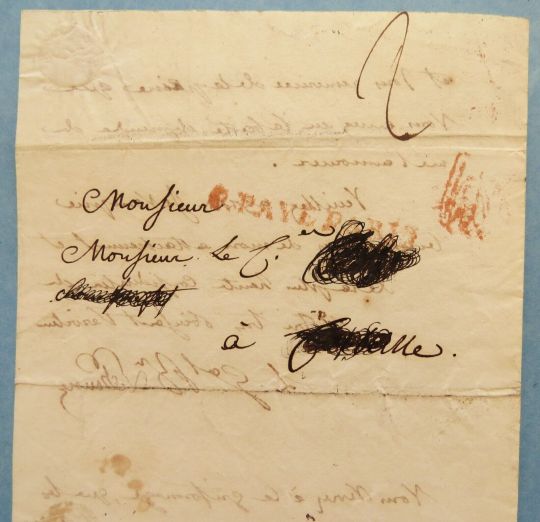
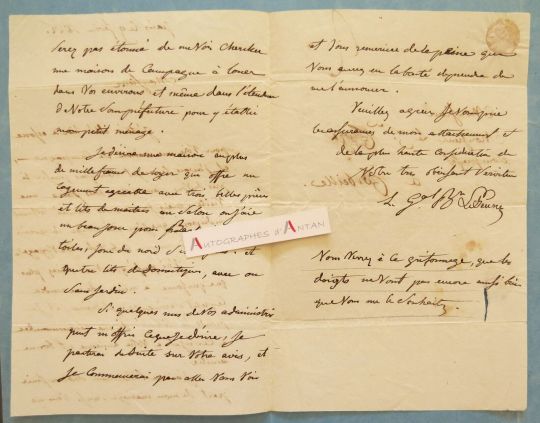
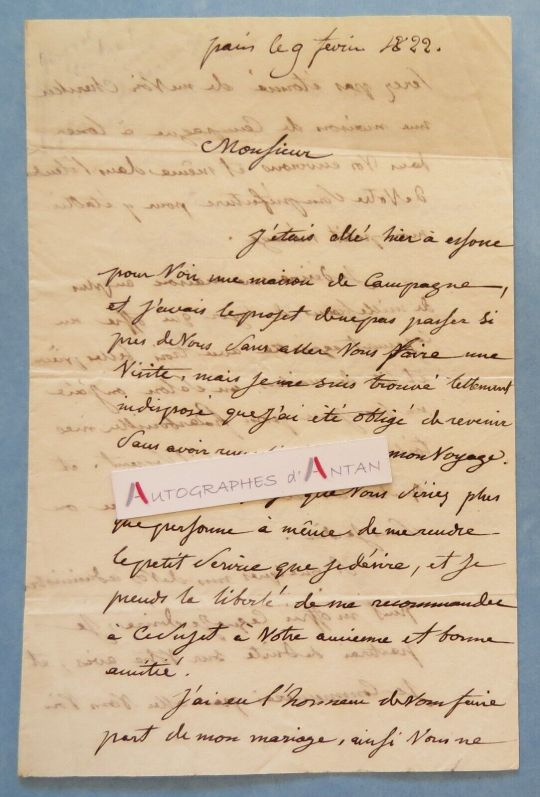

Not sure how useful this is when I can't read 19th century penmanship lol.
oTL his brother's letter is cleaner and did not take me an embarrassingly long time to go WHERE THE FUCK IS "LEJEUNE" EVEN WRITTEN IN THIS.
The seller did transcribe some it, at least.
Hélas, le nom du destinataire a été rayé par le passé, cf photo 3On joint une lettre de son frère (cf photo 1)
" Monsieur,
J'étais allé hier à (?) pour voir ma maison de campagne, et j'avais le projet de ne pas passer si près de vous sans aller vous faire une visite, mais je me suis trouvé tellement indisposé que j'ai été obligé de revenir sans avoir rempli le but de mon voyage.
J'ai pensé que vous seriez plus que personne a même de me rendre le petit service que je désire, et je prends la liberté de me recommander à ce sujet à votre ancienne et bonne amitié.
J'ai eu l'honneur de vous faire part de mon mariage, ainsi vous ne serez pas étonné de me voir chercher une maison de campagne à louer dans vos environs et même dans l'étendue de votre sous-préfecture pour y établir mon petit ménage.
Je désire une maison au plus de 1000 francs de loyer qui offre un logement agréable avec trois belles pièces et lits de maitres un salon où j'ai un beau jour pour barbouiller mes toiles (...) et quatre lits de domestiques, avec ou sans jardin
(........) - Vous verrez à ce griffonnage que les doigts ne vont pas encore aussi bien que vous me le souhaitez.
7 notes
·
View notes
Note
Your blog is a conspiracy theory bulletin board of napoleonic war miscellany connected with red yarn
All Roads Lead to Louis-Francois Lejeune
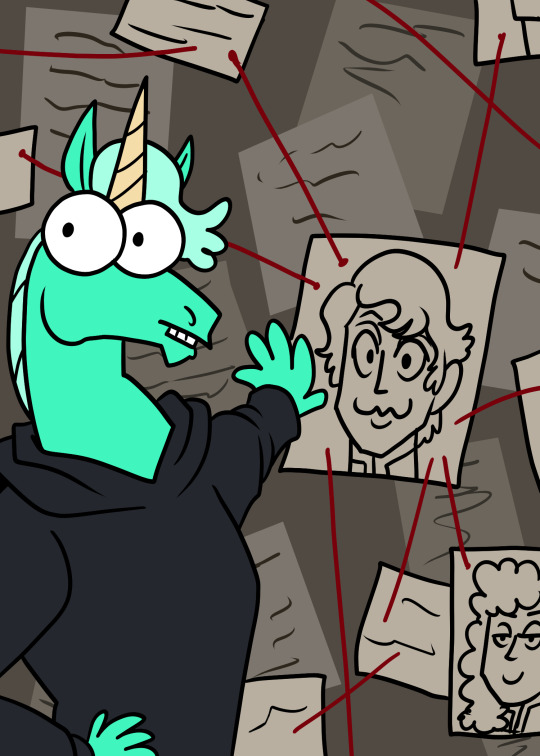
23 notes
·
View notes
Text

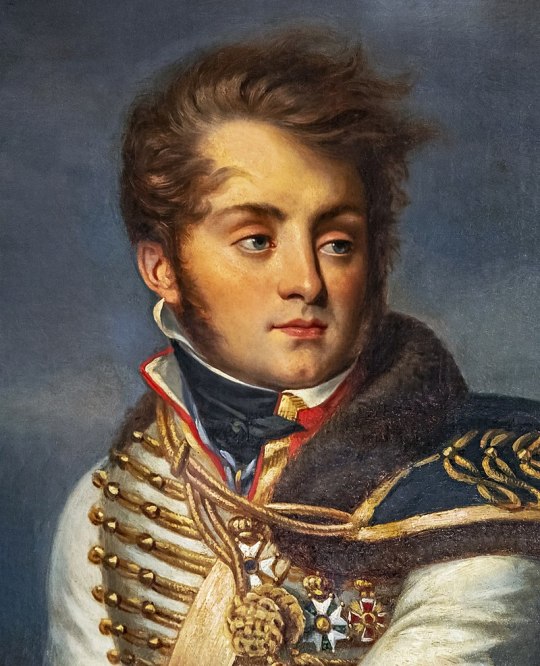
Alessandro Manzoni
"wrote (and revolutionised) some of the most important literature, poems and plays of Italy. Also wrote a fantastic poem about the death of Napoleon but that's less important. He's hated by students state-wide in modern Italy which is why i think it would be funny for him to win. He was even neurotic and agoraphobic!”
Louis-Francois Lejeune
a. “He painted himself attractively into his paintings. He is submitting himself as sexyman.”
54 notes
·
View notes
Text
Bibliography
Primary Sources
Diary of Lucile Duplessis 7-9 July 1788. Found within Lejeune, P. On Diary. Honolulu: University of Hawaii Press, 2009.
Camille to Jean Benoît Nicolas Desmoulins, 24 December 1790. Found within Violet Methley, Camille Desmoulins; A Biography. London: Martin Secker, 1914.
Lucile Desmoulins to Louis-Marie Stanislas Freron, December 1793, found within Claretie, J. Camille Desmoulins and His Wife: Passages from the History of Dantonists Founded Upon New and Hithero Unpublished Documents. London: Smith, Elder and Company, 1876.
Memoirs of the Sansons edited by Henri Sanson: Late Executioner of the Court of Justice of Paris, 1688-1847, Robarts – University of Toronto, ark:/13960/t5r789j67.
Post 1: Lucile Desmoulins’ ‘Little Red Book’, 1771-1794, National Library of France, ark: / 12148 / bpt6k74578p.
Copyright: Florence Rochefort , " Lucile DESMOULINS, Journal 1788-1793 ", Clio. History, women and societies [Online], 4 | 1996, Online since 01 January 2005, connection on 28 September 2020. URL: http://journals.openedition.org/clio/452
Post 2: Rousseau, Jean-Jacques. Emile, or On Education. Geneva: unknown original publisher, 1762.
Post 3: Pierre-Gabriel Berthault and Jean-Louis Prieur, Motion made at the Royal Palace by Camille Desmoulins: July 12 1789, etching completed 1802.
Copyright: [Recueil. Collection Michel Hennin. Estampes relatives à l'Histoire de France. Tome 118, Pièces 10278-10385, période : 1789]. Identifier (FrPBN)41089369.
Post 4: National Library of France, Ego stultus propter Christum, 1790.
Copyright: Source gallica.bnf.fr / Bibliothèque nationale de France.
Post 5: Bibliotheque nationale de France, Les arcades du Café de Foy, 1790.
Copyright: Source gallica.bnf.fr / Bibliothèque nationale de France.
Post 6: National Library of France, Horrible attacks by Francois Comis in Paris on August 10, 1792, 1792.
Copyright: Source gallica.bnf.fr / Bibliothèque nationale de France.
Post 7: Camille Desmoulins, Le Vieux Cordelier, December 30, 1973.
Copyright: Source gallica.bnf.fr / Bibliothèque nationale de France.
Post 8: Camille Desmoulins to Lucile Desmoulins, March 1794, Papers of Camille Desmoulins, The British Museum 1948, 0214.377.
Copyright: The Trustees of the British Museum
Post 9: Jacques-Louis David, Portrait de Camille Desmoulins en famille, 1792.
Copyright: Photo RMN-Grand Palais
Secondary Sources
Abray, J. “Feminism in the French Revolution.” The American Historical Review, vol. 80, no. 1 (1975): 43-62.
Claretie, J. Camille Desmoulins and His Wife: Passages from the History of Dantonists Founded Upon New and Hithero Unpublished Documents. London: Smith, Elder and Company, 1876.
Darrow, M.H. “French Noblewomen and the New Domesticity, 1750-1850.” Feminist Studies, vol. 5, no. 1 (1979): 41-65.
Gliozzo, C.A. “The Philosophes and Religion: Intellectual Origins of the Dechristianization Movement in the French Revolution.” Church History, vol. 40, no. 3 (1971): 273-283.
Haine, S.W. The Word of the Paris Café: Sociability Among the French Working Class, 1789-1914. Baltimore: John Hopkins University Press, 1998.
Hammersley, R. “Camille Desmoulins’s Le Vieux Cordelier: a link between English and French republicanism.” History of European Ideas, vol. 27, no. 2 (2001): 115-132.
Kerber, L. “The Republican Mother: Women and the Enlightenment – An American Perspective.” American Quarterly, vol. 28, no. 2 (1976): 187-205.
Lefebvre, G. The French Revolution. London: Routledge, 1930.
Lejeune, P. On Diary. Honolulu: University of Hawaii Press, 2009.
Lusebrink, H-J and Reichardt, R. The Bastille: A History of a Symbol of Despotism and Freedom. Durham: Duke University Press, 1997.
McPhee, P. The French Revolution 1789-1799. New York: Oxford University Press, 2002.
Methley, V. Camille Desmoulins; A Biography. London: Martin Secker, 1914.
Scurr, R. Fatal Purity: Robespierre and the French Revolution. New York: Random House, 2012.
Sewell, W.H. “Historical events as transformations of structure: Inventing revolution at the Bastille.” Theory and Society, vol. 25, no. 6 (1996): 841-881.
4 notes
·
View notes
Text
Bivouac de Napoléon à la veille d'Austerlitz, 1er décembre 1805
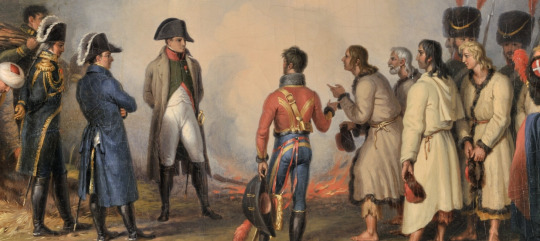


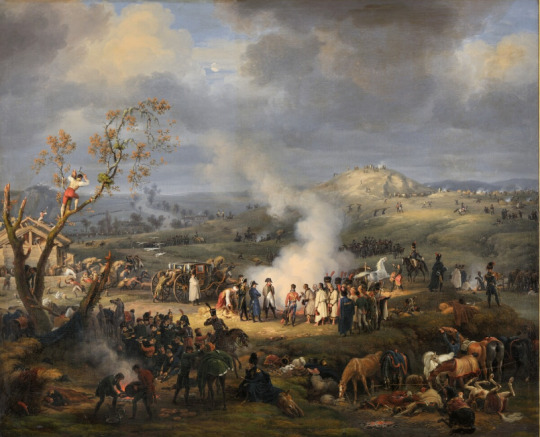
Painted by Louis-Francois Lejeune (1808). Lejeune was also an aide-de-camp and he is in this painting as the central figure with his back to the viewer.
"In the center, Napoleon, surrounded by Marshals Berthier and Bessières, questions Moravian peasants and deserters from the Russian army, whom Lejeune brought him. The artist pictured from behind, dressed in the red and blue uniform of Major General's aides-de-camp. Roustan, the Mamluk attached to the person of Napoleon, who spent the night by the fire, folds a fur blanket. The service squire, wrapped in his coat, waits at the door of the coach. A service page stores in a trunk, at the back of the car, the necessities of the Emperor. In the foreground, the people of Marshal Berthier distribute a meal to his staff officers, while others cut wood or chase poultry.”
https://tinyurl.com/y96jt32s
8 notes
·
View notes
Photo
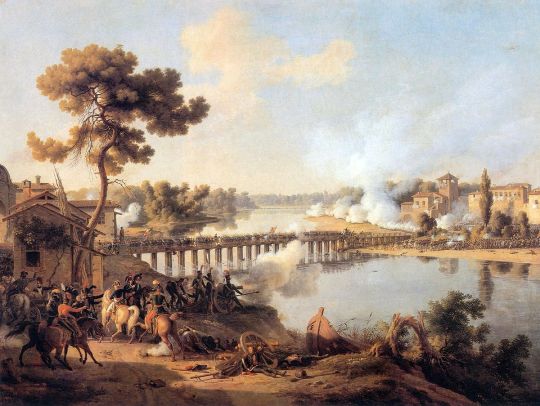
Louis Francois Baron Lejeune - General Bonaparte Giving Orders At The Battle Of Lodi
1 note
·
View note
Photo

Detail : Episode from the Prussian Campaign. 1842. Louis Francois Lejeune. French 1775-1848. oil/canvas. http://hadrian6.tumblr.com
187 notes
·
View notes
Text
Bătălia de la Marengo
Bătălia de la Marengo
Astăzi, 14 iunie 2020, se împlinesc 220 de ani (1800) de la victoria francezilor asupra austriecilor în timpul Războaielor Napoleoniene. Bătălia de la Marengo (un sat în nordul Italiei, la 8 km est de Alessandria), a fost una dintre cele mai mari victorii ale lui Napoleon Bonaparte, care i-a obligat pe austrieci să cedeze Franţei nordul Italiei.
„Bătălia de la Marengo a constituit bătălia cea mai…
View On WordPress
#Austria#cultură#Franța#Giacomo Puccini#istorie#Italia#literatură#Marengo#muzică clasică#muzică de operă#Napoleon#societas#teatru#Tosco#Victorien Sardou
1 note
·
View note
Text


17 notes
·
View notes
Photo
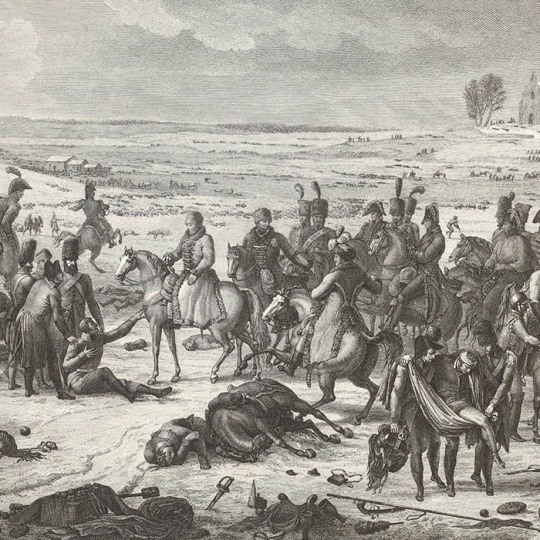
(after Louis François, Napoleon on the battlefield of Eylau)
A brief snippet from Saint-Chamans’ memoirs, taking place on the morning after the battle:
It was during this same visit to the battlefield of Eylau that the Emperor, having seen a young Russian hussar lying on the snow with his leg shattered by a cannonball, had him questioned by an interpreter, who translated the words of this hussar as follows: "Tell the Emperor to have me healed, and I will serve him as I served Alexander.”
Napoleon ordered one of his surgeons to take care of him; I do not know what has become of him since, but this story has provided the subject of several paintings, and I saw shortly afterwards M. Lejeune, a good painter of battles and Berthier's aide-de-camp, working on a painting about this event at Finkenstein.
So, we know how Lejeune spent all those weeks in Poland.
#napoleon's generals#louis francois lejeune#kaxenart#i just love it when the boys meet each other on the job
19 notes
·
View notes
Text
Do you want this picture or not? Hold still. If your muscles start to contract the picture is going to turn out different.
François grumbled, trying to sketch his man in front of him as quickly as possible, so he can be in and out. As a little side hussle he draws men for their wives or lovers. ( Sometimes he draws his own lovers.. ) He typically got a little.. hansy, adjusting them as he needed them to be.
You are beautiful! Beautiful, almost there..
He tried to finish as fast he could, showing the man. The man smirked, looking at him. " How much do I owe? " He asked, redressing.
François chuckled.
40 franks. Thank you.
3 notes
·
View notes
Text
It occurs to me that I have no idea how much money Lejeune made off of his artwork during his lifetime. (though judging money from such a long time ago is always a pain in the ass)
He always seems to be multitasking. Being a soldier, retiring a bit after getting shrapnel to the head, popping back into the military again for a little, running an art school, becoming a mayor, etc.
Though I guess having money from not-art things gave him more ability to do whatever the hell he felt like, such as refusing to sell a painting to Napoleon because he suddenly decided he wasn't done with it and wanting to start his own Salon with blackjack and hookers because the monarchy didn't like his French Revolutionary Wars painting.
Deciding you're not done with an artwork after you have literally posted it publicly is an Artist Mood, honestly.
9 notes
·
View notes